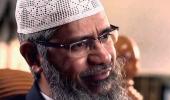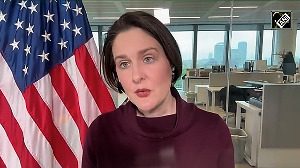After Islamic evangelist and preacher Zakir Naik showed the inability to go to the Indian embassy in Malaysia for authentication of his credentials for vakalatnama, the UAPA tribunal said, "He is bound to file a vakalatnama in proper format with proper authentication or he may remain physically present on the next date of hearing."

The Unlawful Activities (Prevention) Act tribunal noted, "Despite the order passed by this tribunal on the last date of hearing, vakalatnama in proper format, with proper authentication of Dr Zakir Abdul Karim Naik has not been filed."
"The counsel who is appearing for the other trustee of IRF has shown his inability to authenticate the credentials of Dr Zakir Abdul Karim Naik on his vakalatnama. Advocate S Hari Haran further submitted that Dr Zakir Abdul Karim Naik has shown his inability to go to the Indian embassy at Malaysia for authentication of his credentials," the tribunal noted.
The tribunal, during a detailed hearing on February 10, 2022, said, it shall hear the matter physically on the next date and no hybrid or virtual hearing will be allowed during cross-examination so as to ensure the physical presence of the witnesses.
It made clear that the matter shall be taken up on a day-to-day basis from the next date onwards.
The list of witnesses filed on behalf of the Union of India includes witnesses from Maharashtra and the Enforcement Directorate.
On and from the next date of hearing, the witnesses, whose affidavits have been filed and are to be filed as their examination-in-chief, shall be made available for their cross-examination, the tribunal said.
Earlier, the tribunal had sought the response of Zakir Naik and the Islamic Research Foundation to confirm the Centre's decision to declare the IRF as an "unlawful association" under the Unlawful Activities (Prevention) Act.
The ministry of home affairs recently set up a tribunal headed by Delhi high court Chief Justice D N Patel under the UAPA to adjudicate on the IRF’s ban.
The MHA had extended the ban imposed on the IRF, an NGO headed by Zakir Naik, for a further period of five years.
In its notification, the MHA mentioned that if the activities of the "unlawful association" were not curbed, it would continue its subversive activities and reorganise its absconding activists to create communal disharmony, propagate anti-national sentiments and support militancy.
The ministry in its notification had said that Naik's speeches and statements were meant to inspire youths of a particular religion in India and abroad to commit terrorist acts.
Naik's statements and speeches are objectionable, subversive, and promote enmity, hatred among religious groups, the home ministry said on extending the ban on IRF.
The Centre had declared the IRF an unlawful organisation on November 17, 2016, for a period of five years.
The Union home ministry in its notification said the IRF "has been indulging in activities which are prejudicial to the security of the country and have the potential of disturbing the peace and communal harmony and disrupting the secular fabric of the country."
Naik's IRF has been "encouraging and aiding its followers to promote or attempt to promote, on grounds of religion, disharmony or feelings of enmity, hatred or ill-will between different religious communities and groups which are prejudicial to the integrity and security of the country", the notification said.
According to the ministry, Naik makes radical statements and speeches which are viewed by crores of people worldwide.
The ministry said these statements by Naik can also "disrupt the secular fabric of the country by polluting the minds of the people by creating communal disharmony, propagate anti-national sentiments, escalate secessionism by supporting militancy and some people may undertake activities which are prejudicial to the sovereignty, integrity and security of the country".
Naik runs two television stations, namely Peace TV and Peace TV Urdu. Both the channels are banned in many countries including in India, Bangladesh, Sri Lanka, Canada and the United Kingdom.
The IRF head fled to Malaysia in 2016, just before the National Investigation Agency started a probe against him.










 © 2025
© 2025